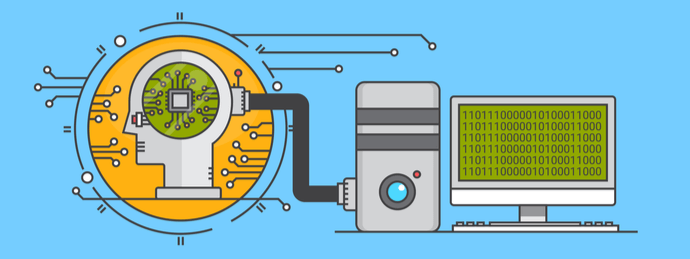According to an article published on Forbes.com, 75% of enterprises utilized artificial intelligence and machine learning to enhance customer satisfaction by 10%.
Additionally, according to one Demandbase report, since 2018, 84% of marketing companies have expanded or implemented AI and machine learning within their teams.
These statistics help to emphasize the importance of using machine learning in marketing and sales by businesses worldwide.
How can machine learning improve marketing and sales?
The short answer is, well, there are a couple of ways. Below, we will discuss some of the key ways organizations can use machine learning in their marketing and sales departments:
- Sentiment analysis and reputation scoring Advancements in natural language processing can help rank copy such as social media posts, online reviews, and customer testimonials by favorability. Sentiment analysis can help predict feelings expressed by customers as well. A reputation index can also be compiled by extracting the text you mention in your product or service. This type of analysis can be effective in understanding ways to improve with deep learning advances.
- Customer personalization With machine learning, you can learn more about your customers through the behavioral data it provides, including descriptive data or click patterns. For better business growth, delivering a highly customized and personalized experience and support to your customers’ journey is essential. Aside from this, customized pricing is another area of personalization to consider here as well.
- Lead scoring You can find a range of tools for lead scoring across the market. These tools often rely on human usage as well as experience to determine what makes a lead good. However, the generic nature of these tools is a significant drawback. No two businesses or markets are the same, and the same applies to customers. And this is where models based on neural networks will come into action. These tools can help to find hidden patterns and cut the guesswork. Ultimately, identifying a lead and providing accurate scoring becomes possible.
- Customer churn and lifetime value modeling Both lifetime value modeling and customer churn go hand in hand. The customer’s churn risk measures how likely they are going to stop interacting with the business. However, on the flip side, a customer’s lifetime value predicts the revenue they will generate for your business. Machine learning can help to model both for your sales and marketing teams to intervene with high lifetime value customers and high churn risk and bring them back with attractive rewards. Sometimes, you can automate the retention strategy as well.
- Customer segmentation and discovery Clustering can help identify data patterns and define how to categorize or label customers depending on different factors, including interest, location, age, and income, among other factors. Gathering more information about your customers will help you make more accurate clusters. However, after that, you can label each cluster with ease. These can quickly help you customize your marketing approaches according to the goals you need to reach.
- Recommender systems Propensity models serve effectively to cross-sell or upsell your customers during their online shopping experiences. According to Mckinsey.com, 35% of Amazon customers and 75% of Netflix customers prefer to buy or purchase what they see in recommendations. Recommender algorithms based on machine learning can be one of the best ways to optimize your message’s accuracy while targeting customers. Doing this can help reduce marketing waste.
- Chatbots and virtual assistants Have you ever interacted with a virtual assistant such as Alexa or Siri? If so, then you might have noticed how advanced they have become over time. It seems that the marketing future is going to be full of virtual assistants and highly sophisticated chatbots. Voice recognition and natural language processing have grown by leaps and bounds within the past few years. Even more, their progress is showing no signs of slowing down.
- Minimize marketing regret A/B testing is an essential tactic that almost every marketer knows. The issue with this tactic is that plenty of opportunities get lost during testing. However, machine learning algorithms can minimize the regret of these lost opportunities. One reason is that these algorithms can help you sample better options naturally and more often.
- Text extraction and summarization Another great natural language processing application is the ability to extract and summarize text automatically. Such kinds of applications can be one of the best and quickest ways to process information, such as news articles after a significant product or service launch, to gauge the market’s reception. Ultimately, correcting the launch score will also become more manageable when needed.
- Marketing mix optimization The marketing mix portfolios are based on intuition and experience, but these can perform remarkably well. Machine learning can remove the guesswork and provide more optimized solutions in this regard. For more effective solutions, machine learning algorithms typically look at prior marketing spends on different channels, including radio, TV, social media, CPM, CPC, and sales. After that, well-optimized funds can be allocated for each channel to ensure maximum return on investment.
- Computer vision Some companies use image recognition to detect the right time to post branded collateral in blogs or social media. However, businesses can use computer vision to analyze extensive user-generated content in blogs, social media posts, forums, and other sources to uncover better ways to connect with promoters and consumers more effectively.
Conclusion
Overall, you can use machine learning in marketing and sales in multiple ways, as we have described. These ways aim to improve your business’s growth with effective customer experience, enhanced customer satisfaction, and improved brand recognition. You can also incorporate machine learning in marketing and sales in any of the ways mentioned above to start reaping the benefits.
Want to start implementing ML/AI based tools into your marketing strategy? Contact Byonic.AI today for a demo and see how we can streamline your marketing and sales process and get results. Schedule a call today.

